- Home
- Michael McDowell
Katie
Katie Read online
KATIE
MICHAEL McDOWELL
VALANCOURT BOOKS
Dedication: For the Friskes: Roberta and Dave, Mary, Millie, and John
Katie by Michael McDowell
First published as a paperback original by Avon Books in 1982
First Valancourt Books edition 2015
Copyright © 1982 by Michael McDowell
Published by Valancourt Books, Richmond, Virginia
http://www.valancourtbooks.com
All rights reserved. In accordance with the U.S. Copyright Act of 1976, the copying, scanning, uploading, and/or electronic sharing of any part of this book without the permission of the publisher constitutes unlawful piracy and theft of the author’s intellectual property. If you would like to use material from the book (other than for review purposes), prior written permission must be obtained by contacting the publisher.
Cover by M. S. Corley / mscorley.com
Money, you think, is the sole motive to deception and devilry in this world. How much money did the devil make by gulling Eve?
Melville, The Confidence Man
PROLOGUE
On Christmas Eve of 1863, at the height of the conflict between the Northern states and the Southern, a nine-year-old girl called Katie Slape sat before the hearth in a set of poor tenement rooms in Philadelphia. She was dressing her doll with scraps of gauze, lace, and silvered cloth – incongruously rich materials in that shabby, dim interior.
The cold December wind blew down the chimney and now and then scattered soot over Katie and her doll. Katie would smile, hold the doll up, and shake the ashes off.
Sitting at the table in the poor room was a woman of about thirty, with harsh lines in her face and no kindness in her eyes. Hannah Jepson was taking care of Katie Slape while Katie’s mother, known professionally as Mlle. Desire, appeared on the stage of the Olympic Theater. Katie’s father was employed as a railroad savage, either building up the Grand Army’s lines in Pennsylvania and Maryland or destroying Rebel lines in Virginia and Tennessee. Katie had not seen him for more than a year.
On the floor beside Hannah Jepson was a wooden crate with eight mewling, scrabbling poodle pups inside it. On the table was a large jug of the cheapest sort of saloon liquor. Hannah would fill a syringe with the noxious liquid, then taking a pup into her lap, inject the full contents down its tiny throat. She repeated this process with each pup. The dogs gagged and spat up over Hannah’s apron and struggled against her tight hold – but most of the liquor remained in their distended bellies.
“Why do you do that?” asked Katie once.
“Stunts ’em,” replied Hannah shortly.
“Why do you want to stunt ’em?” Katie persisted.
“Meant for the fashionable ladies,” Hannah explained. “Fashionable lady don’t want a dog that’s any bigger’n these pups. So I stunt ’em. Feed ’em this gin, and they don’t grow no more. If they live at all,” she shrugged.
Katie watched the operation with interest. “Have you ever seen Mar dance?”
“No,” replied Hannah.
“When Par was here we’d go every evening to see Mar dance.” Katie held up her box of scraps. “These are from Mar’s costumes. Mar wears lovely clothes,” Katie sighed. “See, I made this doll to look just like Mar. I call her Mlle. Desire, just like they call Mar on the bills.”
She held up the doll and Hannah nodded. Hannah was not a woman inclined to be fond of children, but Katie Slape displeased her less than most.
“Want to help me?” she asked the child.
Katie rose eagerly. Hannah filled the syringe with gin and gave it to the child. Katie grinned, took up a pup, and jammed the nozzle down the animal’s throat. She squeezed the bulb and grinned.
The animal jerked, convulsed so that its four legs splayed with a comic suddenness that made both Katie and Hannah laugh merrily. But then the gin spewed up all over Katie’s dress, and the liquor was mixed with blood.
“Pushed too hard,” Hannah remarked. “Likely put a hole in his belly.”
“My dress!” said Katie excitedly, looking down at her front. “That dog ruint my dress!”
“Won’t live,” said Hannah, examining the bloated pup.
Katie lifted her fist high above the table and brought it down hard on the animal’s exposed belly. There was a kind of pop, and the animal seemed to deflate. Blood and gin flowed weakly from its mouth and a fissure that had opened between its tiny forelegs.
Katie raised the wind-rattled window beside the table and flung the expiring dog out into the yard three floors below.
She turned back to Hannah. “What’s Mar going to say about my dress?” she demanded.
The bill that night at the Olympic Theater consisted of the celebrated Ravels in Magic Pills! or, The Conjurer’s Gift, the French ballet, La Vivandière, and a set of classical tableaux entitled The Three Gladiators. Mlle. Desire, Katie’s mother, appeared in the ballet as the Baroness de Grimberg. She had two solos, and danced a polka with Robintzec the Burgomaster, played by François Ravel.
Mlle. Desire had first gone onto the stage only three years before as an infernal Zouave in The Seven Daughters of Satan but, upon the unexpected confinement of one of the principals during the long run of this show, had been promoted to the role of Sulphurine, the devil’s fourth daughter. She had youth and beauty and more than her share of vivacity. She was known for a shining liquid eye, a fire in her steps, and an audacity and wildness that made the other dancers on stage seem mere daubed cutouts. What her audiences did not know, however, was that her fire, audacity, and wildness were almost all the result of a pint of champagne imbibed in the course of her toilet before the performance.
Tonight, in the ballet, her performance was even wilder and more audacious than usual. Some ascribed it to the holiday, but it might more fittingly have been linked to the coldness of the night. To warm herself in the unheated room where she dressed with half a dozen other young ladies, she had consumed an entire bottle of champagne, thoughtfully provided by an anonymous admirer smitten the previous evening.
She was drunk this Christmas Eve, and in the wings she staggered and clutched at the side pieces. But Mlle. Desire had been born a dancer, and her step through the first solo and the polka was unerring.
However, during the Pas de l’Inconstance, to which she and M. Brilliant (who played the Baron de Grimberg) were witnesses at the back of the stage, she quite suddenly lost her balance and to regain it caught hold of a pedestal which supported a large lamp. A portion of the wick of the lamp, which had been saturated with spirits of wine to make it burn brighter, fell upon her gauzy dress and ignited it immediately. Within seconds Mlle. Desire was entirely enveloped in flames.
She rushed off the stage, where all the coryphées stood aghast. Mlle. Hennecart, whose dress was just as volatile, pushed Mlle. Desire back onto the stage with the handle of a broom.
The same anonymous admirer who had sent the bottle of champagne and had secured a seat in the front row for tonight’s performance, leapt onto the stage and, taking off his jacket, flung it over Mlle. Desire’s burning shoulders. M. Brilliant knocked her to the floor of the stage and rolled her over and over again until all the flames were extinguished.
The curtain was dropped, but already more than half the audience had fled the theater in horror.
When the scorched coat was unrolled, Mlle. Desire spilled out onto the stage at the feet of the trembling coryphées, burnt and dead.
At that same moment, Katie Slape sat weeping before the hearth. Tight in her hands she held the doll dressed in gauze and silver, which she had christened Mlle. Desire.
“Child?” said Hannah, looking up from the table.
Katie flung the doll into the fire.
“Ma
r’s dead!” she cried.
The doll’s dress flared suddenly in the coal and was consumed in a moment’s time, but the wooden body began slowly to burn and char.
PART I
NEW EGYPT
Chapter 1
PHILO AND JEWEL
Late one afternoon in March of 1871, two young women happened to meet on the principal street of New Egypt, a village in the central portion of New Jersey. The first, whose name was Jewel Varley, was of slender form and sallow complexion. Her features were mean and insignificant, and her demeanor was one of simpering sophistication that ill accorded with the rural air of New Egypt. Jewel was dressed with more pretension than taste, and though she had hurried forward to overtake the second young woman, it was with haughty condescension that she tapped her acquaintance on the shoulder with her frilled parasol.
“Oh, Lord!” gasped Jewel breathlessly. “I believe it is Philo Drax. Philo, is that not you? Why are you hurrying so? Lightning wouldn’t have time to strike you!”
“Good evening, Jewel,” replied Philo Drax with a polite smile but no evident pleasure at the meeting. “I have been delivering Mother’s sewing for her.”
“You are a very dutiful child,” remarked Jewel, who was seven months younger than Philo. Nothing more was said for a few moments, and Philo was about to hurry on when Jewel detained her by speaking with sudden urgency: “Do you know where I’ve just been?”
“I’ve no idea,” replied Philo, who had slowed her walk to match Jewel’s languorous saunter. She was as plainly dressed as Jewel was ostentatiously, but Philo’s skirt and jacket were neat and scrupulously clean – much cleaner than Jewel’s overlong dress, which dragged in New Egypt’s dust and would have been much more appropriate to the swept walks of Long Branch or Newport.
“I’ve just been to the dressmaker’s,” said Jewel with an arch elevation of her ragged brows.
Philo carried a bundle of mended shirts yet to be delivered, and this she shifted uneasily in her arms. “Your dressmaker?” she questioned. “I thought that Mother was in the habit of making your clothing. I know that in the past—”
“Exactly!” cried Jewel. “That was in the past! Have you not heard?” Jewel glanced demurely aside and rattled the tip of her parasol along the picket fence of Doctor Slocum’s house, which teased the doctor’s hound to furious barking. He hurled himself at the fence, and Jewel poked at him between the pickets.
“Have I not heard what?” asked Philo.
“Oh!” cried Jewel with a smile that Philo thought malicious. “There is a new dressmaker in town, just set up, and I have been to see her. She comes from Trenton and knows all the latest patterns. Ma and I are to be her first customers! She works cheap too. She has just showed me a suit – quite scrumptious – in imitation of a Paris dress. It has ever so much trim, and more bows than I could count in a quarter of an hour, and box-plaiting on the sides, and double quilting round the bottom. There was a waist and a double skirt, and it will only cost me twenty dollars to have done, and it’s all to be made up on a machine!”
“It sounds a deal too grand for New Egypt,” said Philo. Her voice was low and serious, for the arrival of a new seamstress in New Egypt boded ill for her and her mother’s already precarious finances.
“I have no intention of stopping in New Egypt all of my life,” simpered Jewel. “It is all very well for you to remain here, Philo Drax. You and your mother are poor as poverty – you won’t mind my saying so, for you know it’s true – and when you’re poor as poverty, your life is already set out for you. I suppose you will live with your mother until you marry some young farmer or mechanic. Perhaps if you are very fortunate you will be taken to New York on your honeymoon. I am told that these days even farmers and mechanics take their brides on honeymoons, in imitation of their betters. Perhaps you will one day see New York, Philo. I was there this last Christmas.”
“I recall that,” said Philo with hard-won impassivity. Jewel’s remarks were cruel, but Philo knew them to be analytically only too sound.
“Ma and I will spend the summer at Saratoga. Saratoga,” continued Jewel sententiously, “is the most fashionable place in the world. I think it very unlikely that you will ever visit Saratoga.”
“I think you are probably correct, Jewel,” said Philo with philosophical calmness. In exchanges with Jewel, Philo’s only triumph was never to let the other young woman know how her remarks pained; and after a time, Philo had been surprised to discover, they did not. They had come to the Varleys’ home, the largest and handsomest in all of New Egypt. Jacob Varley, Jewel’s father, had established the graniteware factory at the southern end of town. This factory employed a quarter of the population of New Egypt, and Jacob Varley owned many of the houses occupied by his workers. He had also bought up the mortgage of the cottage in which Philo and her mother lived, and it was to him that Mrs. Drax paid nearly one hundred dollars interest each year. Jewel knew of this debt and because of it felt doubly secure in her high-handed treatment of Philo.
Philo Drax was indeed poor. She had no fine clothes, she had no hope of travelling to fashionable resorts, and she had no prospects for a good marriage. But all the town of New Egypt spoke favorably of Philo, and Jewel had often suffered the mortification of hearing that young woman’s praise – accompanied by the unvoiced comparison and dismissal of her own attractions.
“I must go in now,” said Jewel, stopping at the gate. “I’ve dawdled enough with you for one day, I suppose.”
“You stopped me,” corrected Philo.
Jewel sniffed. “I must go in to see if my cousin has arrived.”
“Your cousin? I did not know you had a cousin, Jewel.”
“He is my Aunt Maitland’s son. His name is Henry Maitland. He is excessively fashionable and excessively rich. He went to college at Yale and achieved top honors there. He lives in New York and moves in excessively lofty circles.”
“You will be excessively glad to see him, I suppose,” said Philo, unable to repress a smile.
“Oh, I shall!” Jewel rubbed her parasol lightly against her neck, lifted her chin, and looked carefully at Philo out of eyes that were almost closed. “Shall I tell you a secret, Miss Philo Drax?”
“Please don’t tell me any secrets, Jewel!”
“Why not? Are you not close?”
“Oh, yes, but if the secret were to get out, you would think that I divulged it!” Philo knew that nothing would prevent Jewel from saying what she intended to say, but she did not want the young woman to have the pleasure of being begged for a confidence.
“I shall tell you anyway,” said Jewel with a shrug. She lowered her chin and her voice. “Mother intends that Mr. Maitland and I should be married one day.”
“Which?”
“Which what?”
“Which day?” said Philo. “Which day does Mrs. Varley intend for you to marry Mr. Maitland?”
“Oh, Philo, you are too stupid! Mother intends that I should marry Mr. Maitland some day. She has heard Mr. Maitland say that he likes slender girls, and she has advised me to eat chalk and slate pencils and drink quantities of vinegar. That will make me slender as a straw.”
“Chalk and slate pencils and vinegar is a fashionable diet, I suppose,” laughed Philo. “And may be found on the bill of fare at Saratoga and other exclusive watering places.”
Jewel frowned. Her frown was more natural and not much less pleasant than her smile. “You vex me, Philo Drax. Next week ma is giving a little party in honor of Cousin Henry’s visit. All the best people in the county will be there. If you like, Philo, I will send word to you what night the party is to be given, so that you may walk by the house that evening and see the lights.”
“Thank you, Jewel,” replied Philo drily. “But shouldn’t you dread Mr. Maitland’s looking out one of the windows to see the unfashionable daughter of a seamstress peering over the picket fence?”
“It wouldn’t matter,” replied Jewel. “He would not know who you ar
e.”
“Good evening, Jewel,” said Philo, moving away. “I have been too long delayed.” She delivered the bundle of shirts to the wife of the manager of the graniteware factory, who lived only a few rods away, and when she came out into the twilit street again, she glanced back up toward the Varleys’ house. In the handsome front garden she saw Jewel strolling with a tall, bearded man whose features, in the gloaming and at the distance, she could not discern. Probably that is Mr. Maitland, Philo thought. And at least from the grace of his movement, he seemed every bit as fashionable as Jewel had described him.
Philo turned with a sigh. She knew poverty to be no disgrace, but she could not help but feel a pang that she and her mother should suffer such great and constant unease on account of their slender and precarious means. Philo dreamed waking dreams sometimes of possessing even a quarter of the number of dresses she knew to be in Jewel Varley’s wardrobe. She dreamed of visiting New York and of seeing the ocean. She dreamed of a life that would not be all toil and privation. She dreamed a hundred dreams a day, each pleasanter than the next – but what she did not dream was that the possibility and the means for such a life were so very near at hand.
Chapter 2
MRS. DRAX
All the important buildings of New Egypt were situated along the single main street of the town. These included three churches – the Presbyterian but newly constructed; the livery stable; the two stores which, in sharp competition with one another, sought to sell everything from vegetable seed to dress patterns to sugar cookies at the lowest price possible; the little house which could hardly be distinguished by the name “hotel” but where the few commercial travellers, drummers, and visitors to New Egypt invariably put up; the doctor’s house, the blacksmith’s house, Mr. Varley’s house; and the town graveyard. On a few short streets that were set at right angles to this principal thoroughfare and which terminated at no great distance in fields to the west of the town and a pine forest to the east, were numerous smaller houses of the less prosperous. At New Egypt’s southern extremity, along the railway line, was Jacob Varley’s graniteware factory, and clustered around this were a fair number of workers’ cottages. These workers, with the farmers of the district, served to boost New Egypt’s census to nearly a thousand persons, twice the number which the town had claimed in the years before the War. Because of the factory and the proximity of the railroad, New Egypt was a more prosperous village than many, though some residents complained that it had grown too quickly, or that prices were too high, or that wages at the factory were insufficient to support a family. There were others however who looked forward to the time when the principal street would be paved with bricks.

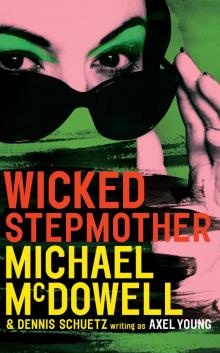 Wicked Stepmother
Wicked Stepmother Blackwater: The Complete Caskey Family Saga
Blackwater: The Complete Caskey Family Saga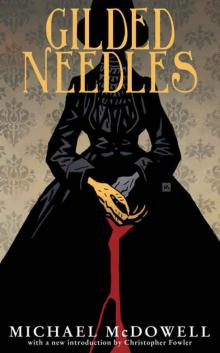 Gilded Needles (Valancourt 20th Century Classics)
Gilded Needles (Valancourt 20th Century Classics)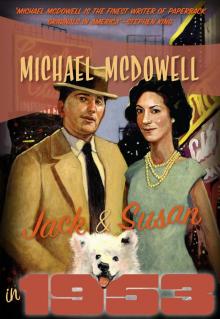 Jack and Susan in 1953
Jack and Susan in 1953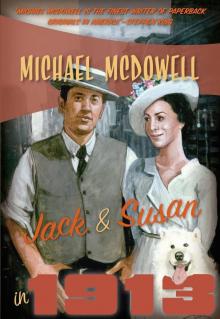 Jack and Susan in 1913
Jack and Susan in 1913 Rain
Rain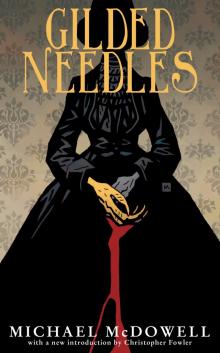 Gilded Needles
Gilded Needles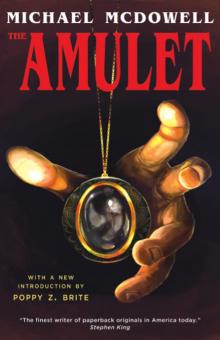 The Amulet
The Amulet Cold moon over Babylon
Cold moon over Babylon The Elementals
The Elementals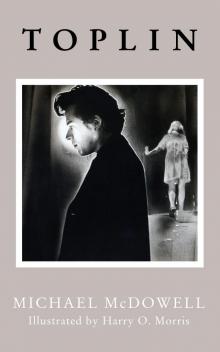 Toplin
Toplin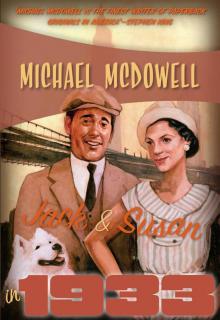 Jack and Susan in 1933
Jack and Susan in 1933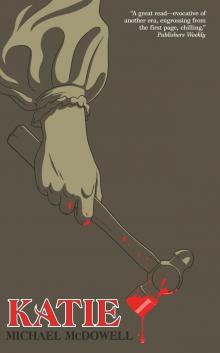 Katie
Katie The Valancourt Book of Horror Stories
The Valancourt Book of Horror Stories